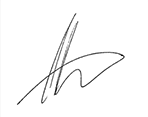I haven’t suffered from writer’s block in a long time.
It was yesterday afternoon when our managing editor, Mike Merson, asked me what I wanted to write about this Wednesday. Around the time I usually wrap up my draft.
I said I didn’t know.
But he had a great idea: “Why don’t you talk about trader’s block?”
And the lightbulb went off…
It’s not much of a surprise that I’m suffering from writer’s block… Because I’m simultaneously dealing with a bit of trader’s block.
Trader’s block is exactly what it sounds like — you can’t come up with any good trades for the life of you.
But it’s how we deal with trader’s block that can make or break our trading game. I’ll explain.
The First Step to Beating Trader’s Block
The first thing to address is that everyone suffers from trader’s block at some point.
Don’t be embarrassed. It happens to the best of us…
Perhaps you just suffered from a series of bad trades. Maybe you just cashed out of a really great trade and you’re scared that’s as good as it gets.
Or perhaps you’re just mentally fatigued. Work, life and other obligations may have gotten in the way.
I guarantee Mike and Chad have dealt with this too (and they’ve figured out ways around it).
I’m battling with it myself at the moment. I was at a loss for how to put my money to work this week.
But now I have a game plan…
Do This… Not This
The mistake most traders make when they can’t come up with any good trades is they just start making random bets. It’s the equivalent of throwing crap at the wall to see what sticks.
Essentially, they try to “force” themselves out of trader’s block.
This inevitably leads to losses and puts you deeper in the mental hole.
The reason we do this is because we get impatient. We want to make money now…
But markets change from week to week.
Sometimes I see opportunities that are oversold in the short term. So I might buy a call that expires next week.
In those moments, I can make money now … and I have an approach for doing it.
Other times I see an opportunity in a stock that has been beaten down over the course of many months. Then, I would buy a call that expires six months to a year from now.
And I’m willing to wait.
Find Your Focus
The appeal of making big, fast gains should not be your sole focus.
Your focus should just be on making good trades — whether the gains are big or small, fast or slow.
To make good trades, you need a systematic approach. This is different for everybody.
My approach is only trading a few stocks I know really well. These are volatile, in-demand stocks that trade on high volume and tend to be a little more popular among retail investors like myself.
These often tend to be mid-cap stocks, worth around $5 to $10 billion.
They’re in newer, future-focused industries (because Wall Street prices stocks into the future).
Some examples include electric vehicle underdog Nikola (Nasdaq: NKLA), commercial spacecraft maker Virgin Galactic (NYSE: SPACE) and leading bitcoin miner Marathon Digital Holdings (Nasdaq: MARA).
These stocks move enough, both up and down, that I can make money in each fairly easily trading options.
And since so many retail investors trade them, I can use very basic principles of human psychology (like fear and greed) to identify overbought and oversold conditions in them. Basically, I just need to stay one or two steps ahead of the dumb money.
These stocks are among a few I trade very heavily. When I don’t see an opportunity in one, I just wait.
Sometimes, the best way to ride out trader’s block is to wait it out. There is nothing wrong with holding cash on the sidelines. You don’t have to trade every day…
There aren’t many jobs where overworking and stressing yourself out can actually LOSE you money. Trading might be the only one.
But the key thing is, you have to feel confident about these trades. If you’re trading only to justify your time in front of the screen, you’re on the fast track to losses.
Mike and Chad’s Cure for Trader’s Block
Of course, trader’s block isn’t much of an issue for guys like Mike Carr and Chad Shoop.
They’re systems traders. That means they use software and proprietary algorithms to find potential trades for them.
Mike, for example, invented an indicator that essentially tells where the Dow Jones Industrial Average is most likely to go over the next two weeks. It’s an indispensably useful tool for short-term traders.
That’s why, if you ever upgrade to his premium research, you’ll know you’re essentially paying Mike to sit at his computer and scan his models and algorithms to find trades for you — so you don’t have to.
This is why I follow Mike’s market timing indicator every week in One Trade. You can learn all about Mike’s strategy here.
Ciao,

Chris Cimorelli
Chief Editor, True Options Masters
P.S. To get content like this in your inbox everyday, subscribe to True Options Masters. Click here and subscribe.










